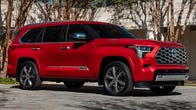The ongoing chip shortage is affecting these Japanese titans differently.
Nissan/ToyotaSemiconductors are a hot commodity these days, as we’ve reported here at Roadshow. The global shortage of computer chips has caused all kinds of headaches in the automotive industry, something that’s hurt certain companies more than others.
According to a report from Automotive News Monday, Toyota in particular is struggling due to the shortage, while rival Nissan is performing better than expected, a surprising reversal of fortunes. Traditionally, Toyota, the world’s largest automaker, is known for its rock-solid profitability, but the company downgraded its global sales and production outlooks following a 21% decline in operating profits in the last quarter. Toyota’s global sales forecast for the current fiscal year ending on March 31 is expected to tumble to 8.25 million vehicles, a significant drop from its earlier estimate of 8.55 million.
Nissan, in comparison, traditionally lags Toyota in many metrics, though the company’s operating profit doubled in the previous quarter thanks to better cost controls and pricing power, among other things. This strong performance has buoyed the automaker’s projected earnings for the year. According to Nissan’s latest financial report, year-over-year retail sales around the world declined slightly less than the industry average. Nissan’s global net revenue per vehicle also increased by 13% in the third quarter of fiscal year 2021 compared to the same period in 2020.
Tight inventory levels across the car business have allowed Nissan to keep incentives low, improving profitability. Basically, the company has no trouble selling every vehicle it can build. But just like Toyota, Nissan expects to move fewer cars and trucks this fiscal year. The automaker currently projects it will deliver 3.8 million units, a significant reduction compared to its previous estimate of 4.4 million.
Toyota and Nissan were contacted for comment but did not immediately respond.
Whether it’s Nissan or Toyota, or Subaru, Ford, Volkswagen or Hyundai for that matter, the global computer chip shortage is hurting automakers. From motorists to C-suite executives, this is bad news for just about everyone, though as Nissan’s latest financials show, some have it slightly less bad than others.
Read more: Why the Heck Is There Still a Chip Shortage for Cars?

